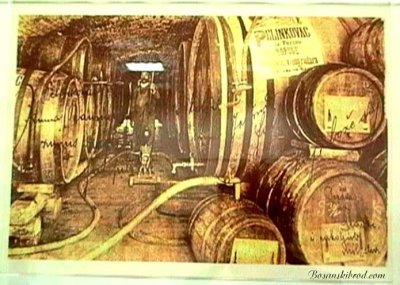Alcohol History- The History Of Alcohol Use
By: Rhea R
March 2nd, 2012
 The history of alcohol points to it being a product of a fermentation process. It is highly likely that it was discovered more by accident than through any rational thinking. It was probably the fermentation of stored grain, uneaten berries and grapes, or even the curdling of milk that led to this discovery, and the fact that consuming such fermented potions did have certain side effects. Mankind then applied its mind to deliberately creating such potions and these gained wide acceptance not only for religious rites but as part of the diet. The oldest known drink that is available even today is ale.
The history of alcohol points to it being a product of a fermentation process. It is highly likely that it was discovered more by accident than through any rational thinking. It was probably the fermentation of stored grain, uneaten berries and grapes, or even the curdling of milk that led to this discovery, and the fact that consuming such fermented potions did have certain side effects. Mankind then applied its mind to deliberately creating such potions and these gained wide acceptance not only for religious rites but as part of the diet. The oldest known drink that is available even today is ale.
Early civilizations used alcohol as medicines and as treatment against bacteria and viruses. Many civilizations developed an expertise in producing alcohol depending on the natural products available in their areas for this purpose. This included some forms of grain, grapes and other fruits. This led to people discovering that alcohol was a salable commodity that they could sell to others or barter to them for other goods scarce in their own area. So alcohol became very much a part of early commerce and even today amphorae of wine are being discovered in sunken ships that carried these as part of trading activity. The making of alcohol became a specialized art practiced by a few for sale to others. It then became quite common for people to buy alcohol for their own consumption from such people and the serving of alcohol in taverns and bars became a practice that is prevalent even today.
The development of international commerce led to certain regions concentrating on alcohol and liquors that they alone could produce because of the natural products that grew in their area. So Scotland used peat and grain for its famous Scotch whiskey. Mexico used the agave plant to produce Tequila and Mescal. The tropics and their vast natural acreage of sugarcane led to rum being distilled, while the grape growing regions of France led to wine and brandy being their natural alcohol based products. All this was also helped by the advances in technology that allowed fermentation in special containers from which such alcohol was distilled so that the final product had no impurities.
The history of alcohol has to take into consideration that drinking it developed into a social habit that acts as a lubricant for connecting people even of diverse backgrounds. Alcohol is widely consumed at family gatherings, weddings, birthday parties and also as part of the wake of a dead person. Because of this habit, alcoholism slowly assumed the status of a social disease linked to its misuse. Social scientists and governmental authorities also tried to curb this ill by introducing prohibition and other laws. Even now the public sale and consumption of alcohol is controlled in most countries through licensing and other means. It has also given rise to rehab centers and the like to wean away addicts from the effects of alcoholism.

